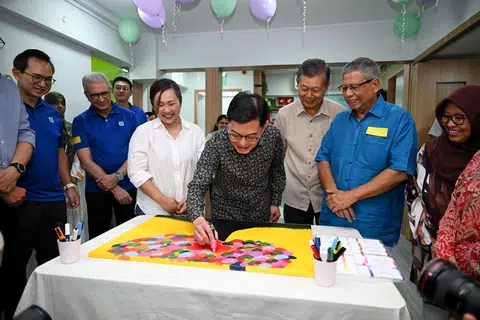Domestic violence survivors get direct aid referrals at new centre
A new one-stop centre will make it easier for victims of domestic violence to get help when seeking shelter from abusive husbands or fathers.
Casa Raudha, a charity that shelters women and children facing domestic violence, has helped more than 600 women and children in the past five years.
On Feb 22, the charity opened its first centre in Bedok, where a simplified help-seeking process allows victims to go through safety assessments and get direct referrals in one location.
Prior to this centre, victims sought help through other referral sources like family service centres, hospitals, police and other community organisations.
Those facing domestic abuse could also call Casa Raudha's helpline, where safety planning for the victim would be done remotely before staff made arrangements for shelter placement.
The new centre will house all the administrative tasks involved in getting help to a victim. Previously, this was done at Casa Raudha's crisis shelter.
Abusers who wish to turn over a new leaf can also use the centre as a safe space to meet their family members.
Previously, meetings with families who were exploring reconciliation were held at external venues as the shelter keeps its location confidential for the safety of its residents.
Deputy Prime Minister Heng Swee Keat, who attended the opening of the centre, said strong and stable families are the bedrock of society, and the foundation for children to grow up to be healthy and well adjusted.

Family violence takes a very deep toll, especially on children, he said.
"We must take a strong stance against family violence, and encourage families to be loving and caring. When we bring children into this world, we have a responsibility to bring them up well," he added.
Mr Heng pressed the importance of reporting such violence.
"Very often, people are worried about reporting... but if we don't, then the problem will continue on and the damage becomes greater and greater," he said.
"I think one aspect of being a neighbour is to provide support where we can. When we see violence and problems, we should be ready to report, and better still, step in and help."
The space for the new centre is provided by Singapore Pools rent-free. The company sometimes offers unused spaces, like the second floor of an outlet, for charities to use for their operations.
Singapore Pools chairman Kai Nargolwala said that offering survivors a safe space and access to essential services provides them with the compassion and support they deserve.
"It tells survivors that they are not alone, that they have a community that cares, and that there are people willing to walk this journey of healing with them. It reinforces the message that everyone deserves to live with dignity, free from fear and harm," he said.
More support for domestic violence survivors
The Women's Charter (Family Violence and Other Matters) Bill was amended in 2023 to strengthen protection for survivors of family violence.
Under the Bill, the definition of family violence was updated to make clear that it includes physical, sexual, emotional and psychological abuse.
Some of the amendments, like the electronic monitoring of high-risk domestic violence perpetrators in some cases where a victim's personal protection order (PPO) is breached, took effect in January.
The minimum age to apply for a PPO was lowered to 18 from 21, as part of the changes. Previously, those between the ages of 18 and 20 who are unmarried need to rely on others, such as their guardians, to apply for a PPO on their behalf.
A 24-hour emergency response team that responds to high-risk family violence cases has also been rolled out since April 2023. It is made up of police officers and social service professionals from the Ministry of Social and Family Development.
The team was given the power in January to issue emergency orders at the scene of high-risk domestic cases, which will immediately stop perpetrators from committing further violence.
An emergency order may include prohibiting the perpetrator from being in the home of and in places frequented by the victim, as well as from visiting or contacting the victim.
A spokesperson for Casa Raudha said addressing perpetrators is essential in breaking the cycle of violence. Casa Raudha works with those who genuinely wish to change through other organisations such as non-profit Thye Hua Kwan Moral Charities.
However, societal stigma remains a barrier, discouraging many from seeking help, the spokesperson said.
"This underscores the need for more community-based interventions that foster safe, non-judgmental spaces for individuals to come forward."
Syarafana Shafeeq for The Straits Times